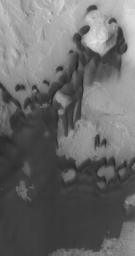
|
Ganges Chasma Sands
- Click the image above for a larger view
- Full-Res JPEG (836 x 1582) (140.0 kB)
- Full-Res TIFF (836 x 1582) (1.3 MB)
Caption:
8 July 2005
This Mars Global Surveyor (MGS) Mars Orbiter Camera (MOC) image shows dark, windblown sand in the form of dunes and a broad, relatively flat, sand sheet in Ganges Chasma, part of the eastern Valles Marineris trough complex. The winds responsible for these dunes blew largely from the north. Sand dunes on Mars, unlike their Earthly counterparts, are usually dark in tone. This is a reflection of their composition, which includes minerals that are more rich in iron and magnesium than the common silica-rich dunes of Earth. Similar dark sands on Earth are found in volcanic regions such as Iceland and Hawaii. A large dune field of iron/magnesium-rich grains, in the form fragments of the volcanic rock, basalt, occurs south of Moses Lake, Washington, in the U.S.
Location near
: 7.7°S, 45.3°W
Image width
: ~3 km (~1.9 mi)
Illumination from
: lower left
Season
: Southern Spring
Cataloging Keywords:
| Name | Value | Additional Values |
|---|---|---|
| Target | Mars | |
| System | ||
| Target Type | Planet | |
| Mission | Mars Global Surveyor (MGS) | Mariner |
| Instrument Host | Mars Global Surveyor | |
| Host Type | Orbiter | Flyby Spacecraft |
| Instrument | Mars Orbiter Camera (MOC) | |
| Detector | ||
| Extra Keywords | Dune, Grayscale, Volcano | |
| Acquisition Date | ||
| Release Date | 2005-07-08 | |
| Date in Caption | 2005-07-08 | |
| Image Credit | NASA/JPL/Malin Space Science Systems | |
| Source | photojournal.jpl.nasa.gov/catalog/PIA03990 | |
| Identifier | PIA03990 | |
